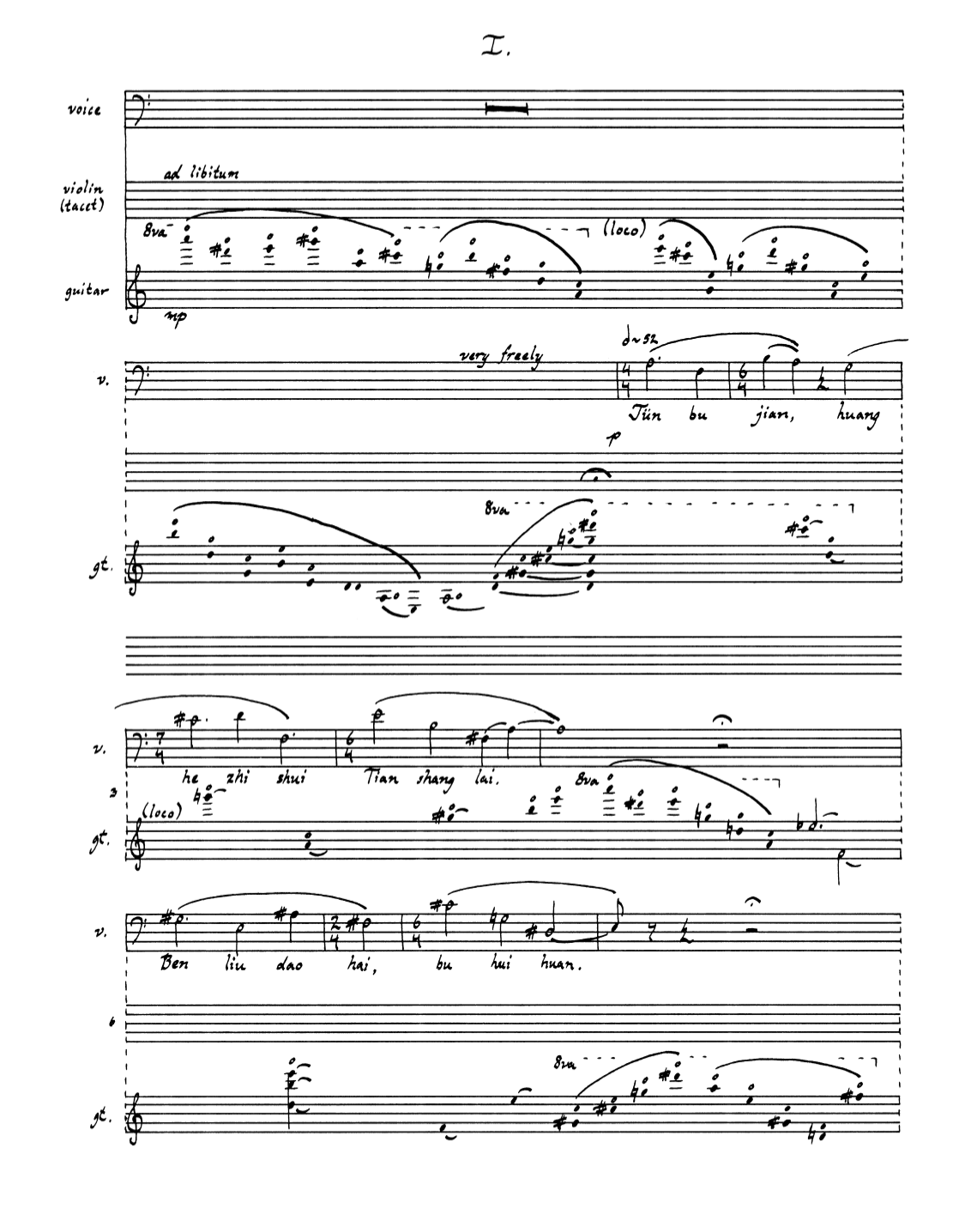As a non-native speaker of Mandarin, I tried to be obsessively loyal to the spoken sound of these poems by Li Bai, as recited by my Chinese family members who grew up with them. The music I added is to complement the music they already contain.
Patrick Mason, baritone; Curtis Macomber, violin; William Anderson, guitar.
November 9, 1999, Merkin Hall, NYC
Li Bai Songs, for baritone voice, violin, & guitar, are settings, in Mandarin Chinese, of Tang Dynasty poetry by Li Bai (701-762). They are dedicated to Dr. Su Yu Xu and Dr. Pei Chen Ning, who introduced me to the poetry and revealed for me its sound and meaning. The songs were premiered November 9, 1999 by Patrick Mason, Curtis Macomber, and William Anderson, on the Washington Square Contemporary Music Society concert series in New York.
Li Bai, also known as Li Po, is one of the most renowned poets of the Tang dynasty, which is widely considered a golden age Chinese poetry. He briefly managed to hold a position in the imperial academy, but because of his rebellious temperament and his notorious drinking habits, he was not well suited to life at court. He was twice forced into exile, and spent most of his adult life wandering the country, writing poetry, and drinking. Chinese musicians have sung Li Bai’s poems for twelve centuries; Western composers who have worked with translations of them include Harry Partch, Charles Wuorinen, Anton Webern, and Gustav Mahler, among others.
一
君不見,黃河之水天上來,
奔流到海不復回。
君不見,高堂明鏡悲白髮,
朝如青絲暮成雪。
人生得意須盡歡,
莫使金樽空對月。
天生我材必有用,
千金散盡還復來。
二
床前明月光,
疑是地上霜。
举头望明月,
低头思故乡。
三
天门中断楚江开,
碧水东流至此回。
两岸青山相对出,
孤帆一片日边来。
四
花间一壶酒,
独酌无相亲。
举杯邀明月,
对影成三人。
月既不解饮,
影徒随我身。
暂伴月将影,
行乐须及春。
我歌月徘徊,
我舞影零乱。
醒时同交欢,
醉后各分散。
永结无情游,
相期邈云汉。
五
日 照 香 炉 生 紫 烟,
遥 看 瀑 布 挂 长 川。
飞 流 直 下 三 千 尺,
疑 是 银 河 落 九 天。
六
船下广陵去,
月明征虏亭。
山花如绣颊,
江火似流萤。
I.
Have you not seen how the Yellow River, which flows from heaven
And hurries toward the sea, never turns back?
Have you not seen how at the bright mirrors of high halls,
men mourn their white hairs,
At dawn black silk, by evening changed to snow?
While there is pleasure in life, enjoy it,
And never let your gold cup face the moon empty!
Heaven gave me my talents, they shall be used;
A thousand in gold scattered and gone will all come back again.
II.
Moonlight in front of the bed,
Or is it frost on the ground?
I raise my head and look at the bright moon,
Lower my head and think of my homeland.
III.
Where Heaven’s Gate Mountain ends, the Chu River begins,
Emerald water flows east and returns north.
The two banks’ blue-green peaks face each other,
A single sail comes, in sunlight.
IV.
Among the flowers, a bottle of wine,
I drink alone, without loved ones.
Lifting my cup, I toast the bright moon.
Facing my shadow, we are three.
But the moon does not drink,
And the shadow just follows my body.
For now, with the moon and shadow I keep company;
We should make merry while it is spring.
I sing, and the moon paces back and forth.
I dance, and the shadow jumbles in disarray.
While sober we share happiness,
Once drunk, we go our separate ways.
In a bond eternal but passionless, we travel.
We will meet far beyond the cosmos.
V.
The sun shining on Incense-Urn waterfall makes purple smoke.
From the distance I see the pouring cloth hanging in front of the mountain.
It flies, flowing straight down three thousand feet.
It could be the Silver River [Milky Way] falling through nine heavens.
VI.
From the boat going to Guangling,
The moon shines brightly over Zhengluo pavillion.
The mountains blush with floral embroidery.
The lanterns on the river flow like fireflies.
(Poem I translated by A.C. Graham,
poems II-VI translated by P.C. Ning.)
